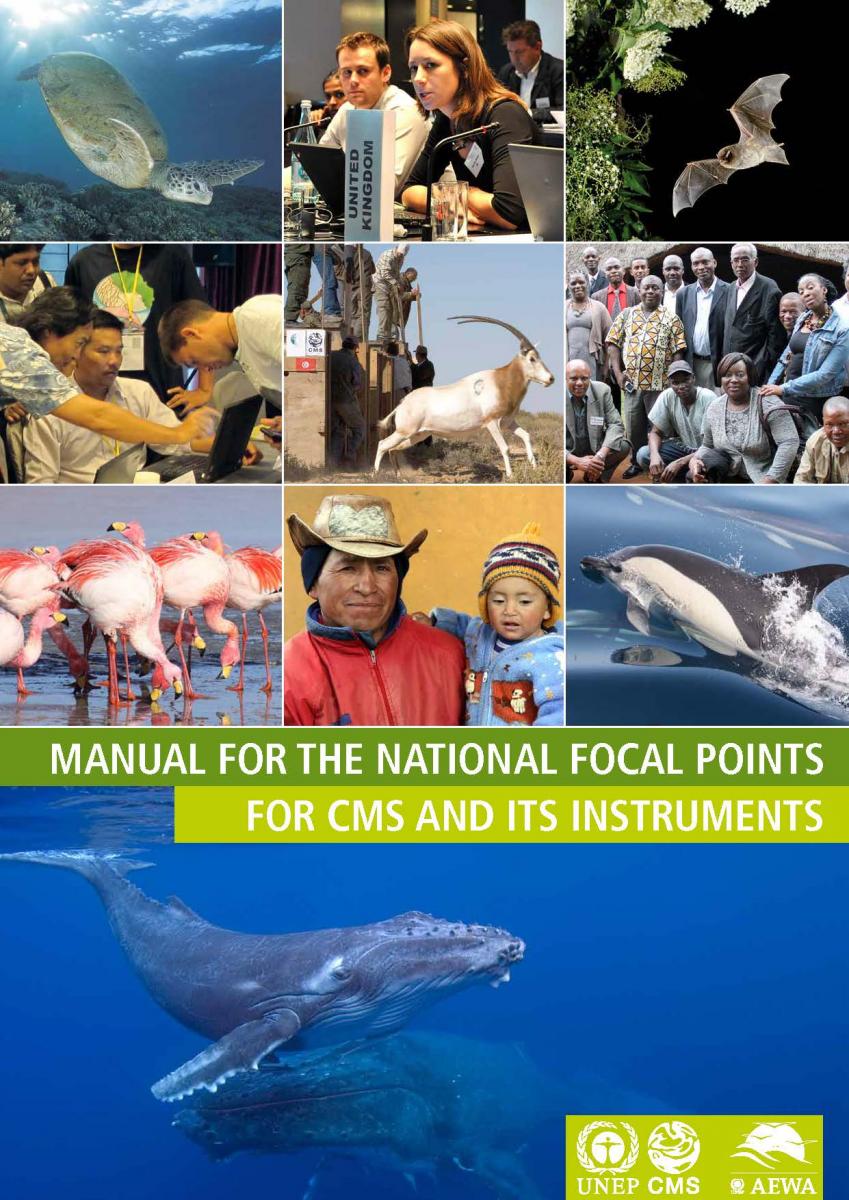Capacity building is a long-term, continuing process encompassing a country’s human, scientific, technological, organisational and institutional capabilities. It has been clear for many years that inadequate capacity in developing countries and countries with economies in transition puts them at a continued disadvantage and prevents them from reaping the environmental, social and economic benefits offered by full compliance with MEAs.
Capacity building tools for the CMS Family:
Workshops and other Activities
CMS Family Manual

The "Manual for National Focal Points for the CMS instruments" was developed to enhance the capacities of focal points to all instruments of the CMS Family. It will invigorate the active participation of NFPs in decision-making, sharing knowledge and wisely managing and executing their numerous tasks related to the Convention and its Instruments.
The Manual is available in all three languages of the Convention and the online version is fitted with hyperlinks that cross-reference relevant passages on a topic, practical examples and useful tips and has checklists at the end of every chapter, making it a very user-friendly online tool. Please find all three versions below.
- Manual for the national focal Points for CMS and its instruments
- Manuel destiné aux Points focaux nationaux de la CMS et de ses instruments
- Manual para los puntos focales nacionales de la CMS y sus instrumentos
E-community
The main objective of the CMS Family NFP e-community is to support NFPs in fulfilling the different aspects of their roles, especially in implementing CMS and its instruments. Therefore, the platform will provide factual background knowledge about CMS, its bodies, instruments, procedures etc. and explain the roles of the NFPs. Practice Examples will illustrate different aspects. Additionally, the platform aims to offer hands-on support tools to facilitate the work of NFPs, such as checklists, information on funding programmes or training events. The platform concept follows a “knowledge-on-demand” approach and responds to different levels of prior knowledge and user needs by segmenting the information into modules and by providing different access paths to the information.
Communication functionalities provided on the platform foster discussion and the exchange of experience among the NFPs. Additionally, knowledge transfer via the platform should be complemented by training events (online and face-to-face). Offering a sound mix of information, knowledge management, communication and networking, the aim is to create a community-of-practice where NFPs mutually support each other by collaboratively learning on the job. The platform aims to encourage participation, to invite an open informal debate and to create a trusting atmosphere where it is no problem to admit lack of knowledge, declare problems, ask questions and voice doubts or concerns. It is not intended to use the e-community platform for formal communication (e.g. invitation to COP, submission of official statements).
Both tools were brought to fruition thanks to the generous financial support from the ENRTP Strategic Cooperation Agreement between the European Commission and UNEP. Its objective is to contribute to activities under the project "Effective Implementation of CMS, AEWA and other CMS Family instruments across various regions and languages through capacity building", over the period 2012-2014.
Migratory Species in NBSAPs
Although NBSAPs take into account key biodiversity issues, they often fail to integrate migratory species which may not be endemic or a major component of the local biodiversity. However, as a whole, migratory species are often important constituents of the local, national and regional biodiversity. As such, the integration of migratory species into NBSAPs can be just as important as the integration of endemic species.
Since migratory species are seen as an integrated part of a countries conservation and sustainable use of biodiversity they cannot and should not be targeted by a separated implementation tool. As such, their integration into NBSAPs can be seen as often not only important for the conservation of migratory species but for the overall national biodiversity and sustainability. Additionally NBSAPs are encouraged to address direct threats, such as climate change, pollution and invasive alien species, which can often have a more pronounced effect on migratory species.
More information is available at: http://nbsapforum.net/, a forum that provides support for action and implementation on NBSAPs through 2020.
- Guidelines on the Integration of Migratory Species into National Biodiversity Strategies and Action Plans (NBSAPs) (UNEP/CMS/Conf.10.27)
- Lignes directrices sue l'intégration des espèces migratrices dans les stratégies et les plans d'action nationaux pour la biodiversité (SPANB) (UNEP/CMS/Conf.10.27)
- Directrices sobre la integración de especies migratorias en las estrategias y planes de acción nacionales de biodiversidad (EPANB) (UNEP/CMS/Conf.10.27)
Capacity building workshops and other activities of the CMS Family
Please click on the links below:
Workshops organized by the CMS Secretariat
Capacity building under the African Initiative of AEWA

